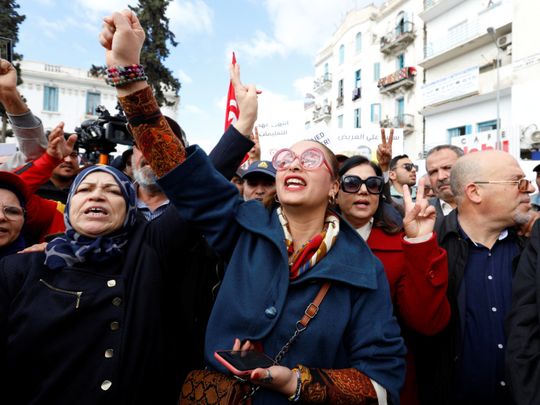TUNIS (Reuters) Jan,14– Call for the resignation of Tunisian President Kais Said against his near-total seizure of power to mark a momentous anniversary of the 2011 revolution that brought democracy Thousands of protesters marched in central Tunis on Saturday.
Thousands of people waving Tunisian flags and chanting “The people are demanding the overthrow of the regime,” said Reuters journalists. It was full of protesters.
“Tunisia is going through one of the most dangerous times in its history. Said has taken control of all authorities and attacked democracy. The economy will collapse. We are not silent,” said 34-year-old protester Saeed Anoar Ali.
Demonstrators pushed past police and metal barricades to reach the streets, defying authorities’ initial efforts to separate several parallel protests called by various political parties and civil society organizations.
“We were in Bourguiba when Saeed was not around in January 2011. Today he is closing Bourguiba for us. ‘ said Chaima Issa, an activist who participated in the 2011 revolution, before the crowd burst through the barrier. Another major opposition party, allied with the pre-revolutionary tyranny, held another rally in downtown Tunis after being banned from marching near the Carthaginian presidential palace.
Said closed his 2021-elected parliament and initiated a transformation of the political system, but low voter turnout in December’s elections for a largely powerless new parliament was a sign of Said’s change.
Meanwhile, the economy has languished, staple foods have disappeared from shelves and governments face financial collapse, yet to secure an international bailout.
Major political forces, including most parties and trade unions, now oppose Said’s project, many calling it an anti-democratic coup.
But instead of forming a united front, they failed to bridge the deep ideological and personal rifts that had divided them over the years. Many political parties have rejected the role of Islamist Ennada, still the largest party. The powerful trade union UGTT is calling for a nationwide dialogue, but will not invite parties that accuse Said of a coup.
The protests take place on the day 12 years after the ouster of former dictator Zin al-Abidin Ben Ali, and January 14 is considered Revolution Day by most Tunisian political parties and civil society groups.
However, Saeed unilaterally changed his official anniversary, saying he was considering January. 14 as the moment the revolution went astray.
While there has been no major crackdown on Saeed’s opponents and police have allowed most protests against him, their response to the January 14 demonstration last year was more aggressive, leading to condemnation by rights activists.
